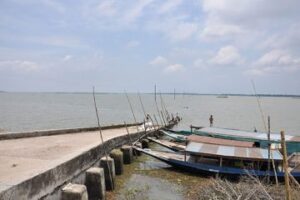 During monsoon season each year, heavy rain and onrush of water from the upstream causes overflowing of rivers and consequently cause flash floods in Bangladesh’s low lying lands. These flash floods have caused serious damage to agricultural lands, people’s homes, and livestock. It is expected to be no different this year. The overall impact, however, is likely to be much worse than any previous year due to the global pandemic caused by coronavirus disease 2019 (COVID-19).
During monsoon season each year, heavy rain and onrush of water from the upstream causes overflowing of rivers and consequently cause flash floods in Bangladesh’s low lying lands. These flash floods have caused serious damage to agricultural lands, people’s homes, and livestock. It is expected to be no different this year. The overall impact, however, is likely to be much worse than any previous year due to the global pandemic caused by coronavirus disease 2019 (COVID-19).
Moriom, a 32 years old lady from Chowhali, Sirajganj is the wife of a day laborer who also works as a migrant worker. At this moment, her husband has no opportunities to work in their area as well as outside due to the travel bans imposed for the pandemic. Due to lack of work, they are finding it difficult to meet their daily needs. There is no scope for preparing for the bad days as the lockdown has already brought in hardships. Moriom says “Usually, we keep some of the money that my husband earns during the harvesting season until June to prepare for the floods during monsoon. We could not prepare this year due to the pandemic. All the reserved food we have at home has already run out. Things are hard as we have no money at hand. If floods do come, we will probably have to starve to death.”
To repair participants’ damaged homes and increase resilience to face any future floods, SHOUHARDO facilitated a repairing process through its Cash For Work (CFW) initiative in response to previous year’s flooding that affected northern Bangladesh, where the program works. SHOUHARDO participants were involved in the plinth raising of local houses and received cash in return. The affected participants received BDT 5000 (USD 58) for repairs, BDT 200/ day (USD 2.3) for nine days of work, and BDT 2700 (USD 31) for livelihood support after the floods. Shukhi, a 43-year SHOUHARDO participant and her family from Jamalpur were living with more comfort after plinth raising. “I have cultivated different vegetables on the plinth for consuming during tough situations. We were hoping that the coming years will not be as bad as it was last year.”
Shukhi used to work as in others’ houses and lands, along with her day laborer husband but they no longer have work. Before being able to take any concrete preparations for the upcoming floods, Shukhi’s family were slammed with the pandemic – something they were not ready to face both financially and emotionally. Like Moriom, her food reserve is also going low. Now she is thinking about selling the productive assets she bought utilizing funds from SHOUHARDO last year. She said “I purchased a goat with the money received. In the coming months, in case of extreme crisis, I might sell that so we can hopefully survive.”
The most vulnerable people tried to reserve dry food and take other precautions for facing possible floods over the monsoon. Like most people in the world, they had not seen the COVID-19 pandemic coming. All preparations they took for the floods had to be consumed within the pandemic before the floods even arrived. Now they can only hope that the severity of the floods will be less than the previous years.
Written by Iffat Khan, Knowledge Management Coordinator of SHOUHARDO III, CARE Bangladesh.


